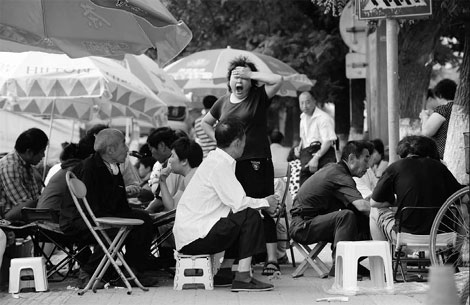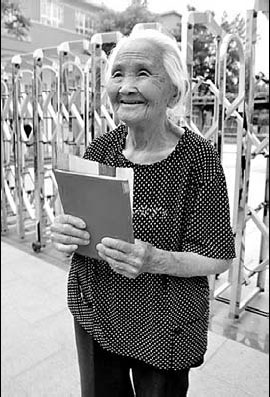Life and Leisure
Bursting at the seams
By Mei Jia (China Daily)
Updated: 2010-09-07 08:07
 |
Large Medium Small |
|
Parents and grandparents carrying stools and umbrellas line up for days and nights to get their kids into the public kindergarten this June in Changping district, Beijing. China Photo Press |
Public kindergartens are struggling to cope with thousands of 3-year-olds born in the boom year of 2007 - the auspicious Year of the Golden Pig, Mei Jia reports
In June, Gao Yuexia, 96, her son and grandson, took turns to line up for nine days and nights to enroll Gao's 2-year-old great-granddaughter in a public kindergarten in northeastern Beijing's Changping district.
Some 200 parents vied to get their kids into the kindergarten whose modest monthly charges of 400 yuan ($59) made it a popular choice with many young couples.
"While waiting for days is no 100 percent guarantee of a spot, not joining the queues could mean very little chance of finding a proper kindergarten for our child," says a father surnamed Chen.
Getting a place in a kindergarten that is affordable and conveniently located is posing a major headache for parents with children born in and after 2007.
Two popular sayings doing the rounds this summer are that, "Entering kindergartens is harder than being recruited as a public servant" and, "Attending kindergartens is costlier than going to university."
The existing capacity in public kindergartens is unable to cope with the sudden increase in births in 2007, the year of the golden pig, considered auspicious for having babies by the Chinese. The baby-boomers have now entered the kindergarten-going age of 3 this summer.
Xinhua News Agency reports that only 73,000 out of Shenzhen's 135,000 kids born in 2007 will find a kindergarten spot. A Southern Daily report says Beijing saw 415,750 births between 2007 and 2009, but has only 248,000 spots in the registered kindergartens.
Song Lihong, 34, a full-time mother of a 3-year-old in Beijing, began her hunt for a kindergarten last April. The public ones, known for their lower fees and more reliable quality, were Song's preferred choice.
She went to almost all of those near her home, and found they charged 600-900 yuan per month, but would accept only children who meet the strict requirements of hukou (registered household certification).
"Parents with no Beijing hukou, like us, have to pay a so-called voluntary amount of at least 50,000 yuan ($7,300) over three years, which is beyond us," she says.
"But even so, we tried to find some way to give this extra money."
When she couldn't, she finally turned to a private kindergarten and got her kid in after waiting for three months.
"It's more expensive, but we have no choice," she says.
|
Gao Yuexia, 96, smiles as her 2-year-old great-granddaughter was admitted by the kindergarten after she (with other relatives) lined up for nine days. Hu Yu / For China Daily |
Song says her family is under intense financial pressure.
"Our threshold for kindergarten fees was 1,000 yuan, but now I pay 1,700 yuan. And then there is the rent to take care of," she says.
Like Song, Liu Jingjia, 32, a vocational school teacher in Kunming, Yunnan province, is also considering a kindergarten although her daughter is not yet 2.
"The public kindergartens are cheaper but hard to get in; the private ones are easier but far more expensive," Liu says.
She says she hopes starting her search early will bring her better luck than Song.
Zhang Yan, a pre-primary education expert with Beijing Normal University told The Beijing News: "The real problem is not getting into a kindergarten, but into an affordable and reputable one."
Feng Xiaoxia, with China National Society of Early Childhood Education, told Xinhua recently that "the imbalance in public and private kindergartens, and limited governmental input in pre-primary education, are the reasons" for the difficulties facing parents.
In growing recognition of the problem, the National Education Conference held this July made "advancing the equality in education" a major emphasis.
The final draft of the National Plan for Long-Term Educational Reform and Development (2010-2020) released recently also pays particular attention to the "kindergarten puzzle". It hints at increasing official input to promote the development of both public and private kindergartens.
Shanghai is already taking the lead by extending the number of kindergartens to keep pace with the construction of new residential buildings. Beijing is also planning to build 118 new kindergartens and renovate 300 old ones in the coming years.
"If we're lucky enough, I'd like to get my daughter registered by September next year," says Liu, expressing a hope that is on the minds of many young parents.

